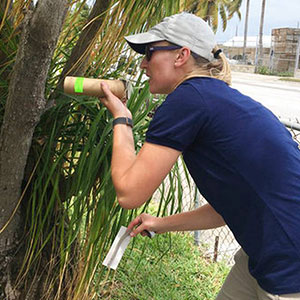
Research entomologist Catherine Pruszynski releases the male mosquitos.
Photo: Florida Keys Mosquito Control District
The Florida Keys Mosquito Control District is testing a new way to control Aedes aegypti mosquito populations by releasing bacteria-infected mosquitoes. The district released 20,000 male mosquitoes from Kentucky-based MosquitoMate infected by the Wolbachia bacteria.
Aedes aegypti mosquitoes can spread the Zika virus, dengue fever and chikungunya to humans.
The male mosquitoes infected with Wolbachia — which is harmless to humans — will mate with female mosquitoes, who then become infected and don’t survive adulthood.
“The eggs never even hatch,” MosquitoMate Founder Stephen Dobson told The Charlotte Observer.
Staff members released the infected mosquitoes by blowing through the cardboard tubes the mosquitoes were transported in.
“Keys officials are still considering a separate test of mosquitoes genetically modified by the British biotech firm Oxitec to produce Aedes aegypti offspring that die outside a lab,” says The Charlotte Observer. “The U.S. Food and Drug Administration initially approved a trial in a residential neighborhood near Key West, saying the test would not significantly affect the environment, but outrage from anti-GMO activists and residents forced the district to find a new location.”
MosquitoMate is awaiting permits from the U.S. Environmental Protection Agency to sell Asian tiger mosquitoes (A. albopictus) infected with Wolbachia as a pest control service, according to the newspaper.
What isn’t being said is the most likely co-factor involved in the Zika and future outbreaks: Wolbachia. Why? Because four gov’ts and the Bill & Melinda Gates Foundation are funding it. Many research depts desperately need that money.
But, Wolbachia can never be taken back. Wolbachia is responsible for the most widespread pandemics in the animal kingdom (LePage and Bordenstein, 2013).
Safety tests were never carried out on vertebrate species prior to Wolbachia-infected mosquito releases. Wolbachia can survive (at least) a week in a dead host; Zika for five days . . ample time for other organisms and mosquitoes to acquire and spread disease.
In fact, Culex that naturally acquire Wolbachia are better vectors of malaria and West Nile virus (very similar to Zika). Some species of Culex larvae will prey upon Aedes aegypti larvae. There are multiple ways this can happen.
Wolbachia doesn’t just magically disappear when these mosquitoes die off naturally or are consumed.
“These genetic tools might not be the best strategies for ZIKV given that at this point there seem to be multiple vectors not only at the species but also at the population level. The current genetic technologies would not be appropriately applied to such complex systems.” Source: https://f1000research.com/articles/5-2546/v2
I have submitted my comment to the FDA about the dangers of Wolbachia-infected mosquito releases. Here is a video recording (transcript shown at end): https://www.youtube.com/watch?v=kY_IymvoIG8&t